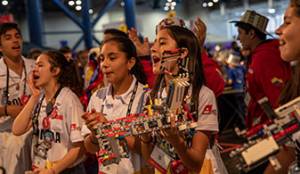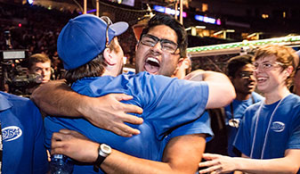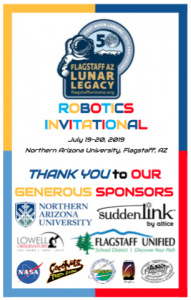Northern Arizona University’s Center for Science Teaching and Learning (CSTL), along with many Science, Technology, Engineering, and Mathematics (STEM) partners hosted the Lunar Legacy Invitational Robotics Challenges on July 19th and 20th. Robotics teams from all over the world participated in the three challenges. Each challenge required their robots to perform certain tasks with precision and accuracy. In the Apollo Next Giant Leap Student (ANGLeS) challenge, the winning team was from Killip Elementary here in Flagstaff, Arizona.
Middle School and High School teams competed for one grand prize position: though the Cienega High School team was very close in points, the Flagstaff Killip team won the prize. By winning the ANGLeS Challenge, the team has the opportunity to take an all-expenses-paid trip to the Johnson Space Center in Houston, Texas. The CSTL is committed to impacting the lives of students by supporting the development of the best possible science and mathematics teachers, while elevating the capacity of practicing teachers. CSTL teams do significant outreach, research, evaluation, and academic efforts for STEM education and this collaborative event is only one recent example.
This year brought many enthusiastic students together from around the world, coming from Hong Kong to our local Flagstaff schools. Hanna H. from Vail, AZ shared that what she loved most about robotics was: “Being able to overcome the challenges as a team, working together. Also that feeling of excitement when you finally get it.”Another participant of the Robotics Challenges, Mackenzie M. from Thatcher AZ, shared that when she grows up she wants to be “…a programmer, or a rocket scientist, or a vet.” The CSTL would like to thank the many volunteers, partners, contributors and competitors for helping make this exciting event the success it was!
Robotics Challenges: Lunar Legacy Invitational
Lunar Legacy Invitational: Full STEM Immersion
All teams had the following opportunities:
- Participated in challenges & earned awards
- Supported & learned from peers by checking out other challenges
- Participated in guest speaker & professional development sessions:
– Planetary Science
– How to Take the Next Step in STEM
Joined a tour to visit & experience the Lunar Legacy of Flagstaff, AZ
★ Walked where astronauts walked & trained at local crater fields
★ Saw where Pluto was discovered: Lowell Observatory T our
★ Learned about Arizona’s role in NASA and Planetary Science
★ Learned about the future of STEM
First Lego League (FLL): Into Orbit
Tomorrow’s innovators practiced imaginative thinking and teamwork. FIRST LEGO League teams researched real-world problems such as food safety, recycling, energy, etc., and were challenged to develop solutions; and design, build, and program a robot using LEGO MINDSTORMS® technology, then compete on a table-top playing field. Teams had up to 10 students ages 9-14.

Apollo Next Giant Leap Student Challenge (ANGLeS): Lunar Lander
Completed a NASA challenge celebrating the 50th anniversary of the Apollo Moon Landing. ANGLeS, the great introductory STEM challenge for teams of 2-5 in grades 5-12.
Landing: Designed a Lunar Module, similar to the one used to recreate the Apollo 11 moon landing. Flew a drone carrying Lunar Module and landed it on a designated landing zone on the lunar surface.
First Steps: Once drone dropped off Lunar Module, the teams would place their EV3 Lunar Rover on the moon.
Objectives: In the last faze, the teams programmed the Lunar Rover to traverse the lunar surface and complete a series of objectives.
First Tech Challenge (FTC): Rover Ruckus
First® Rover Ruckus Presented by Qualcomm® Incorporated was played on a 12 ft. × 12 ft. (3.7m × 3.7m) square field with approximately 1 ft. (0.3m) high walls and a soft foam mat floor. The object of the game was to attain a higher scores than the opposing alliance by descending from the Lander, collecting Minerals from the Crater, sorting and scoring Minerals into the Cargo Hold of the Lander, performing autonomous tasks, and navigating to specific parts of the Playing Field.

First Core Values: It’s way more than building robots. We expressed the FIRST philosophies of Gracious Professionalism and Cooperation through our core values:
- Discovery
- Innovation
- Impact
- Inclusion
- Teamwork
- Fun
